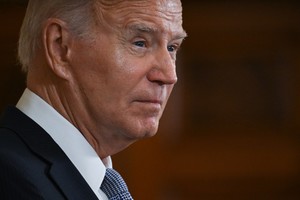When Democrats Cross Their Fingers

Joe Biden won the South Carolina primary last weekend. Yawn.
It shouldn’t be much of a surprise that an incumbent president who is running essentially unopposed for his party’s nomination would win an election in the state that he hand-picked to begin the new Democratic primary calendar. (Technically, backbench House member Dean Phillips and self-help author Marianne Williamson also appeared on the ballot, but combined for less than four percent of the vote.) The more important question is: why does an 81-year-old incumbent president struggling with historically low approval ratings and suffering from deep apathy from critical portions of the Democratic base not have a more credible primary opponent?
Remember that more than 20 other Democratic candidates ran against Biden only four years ago. Add to that the passel of younger party leaders who have ascended to statewide office since then and are eyeing a future run for the presidency. Biden is old and unpopular, and concerns about his health and age are matched only by worries that his vice president would be an inadequate replacement for him, both on the campaign trail and in office. There is no shortage of Democrats who would clearly be eager to pursue the top job themselves. But all of them are deferring to Biden without even the faintest rumor of dissent.
Biden believes strongly that he is the Democrat best positioned to defeat Trump in the fall, primarily because he sees no other Democrat who is able to attract support from the white working-class voters who helped elect Trump in 2016 but defected four years later. That may be correct, although rising party stars like governors Gretchen Whitmer of Michigan and Josh Shapiro of Pennsylvania have demonstrated an ability to win those voters in their own campaigns. And of course, Biden has defeated Trump before, a claim that no other American politician can match.
But polls also show that large numbers of Americans are deeply concerned about Biden’s advanced age. (Trump is only a few years younger, but the 77-year-old challenger does not elicit the same level of worries.) Despite Biden’s seemingly good health, the possibility of a man of his age not being able to handle the demands of the presidency until January 2029, when he will be closer to 90 years old than to 80, are considerable.
Anxious Democrats know that a senior moment on the debate stage later this year could doom Biden’s campaign almost instantaneously, let alone a more serious and lasting health matter that could remove him from the campaign trail altogether. Should such an incident take place over the next two months, there would be enough time before the party’s national convention this July to hurriedly arrange an abbreviated primary calendar in which several candidates could compete, with a battle-tested nominee emerging to take on Trump in the fall.
But if Biden were to be forced from the campaign later in the spring or over the summer, there would be no time for a contested nomination process. Vice President Harris would become the party nominee, a prospect that would cause heart palpitations among most Democratic loyalists. It would be a political impossibility for Biden to replace Harris as his running mate at this point (and the increasingly central role of the abortion issue in Democratic messaging strategy raises the question whether replacing her would be such a good idea anyway). Putting her at the top of the ticket, on the other hand, could be a very risky proposition.
All of which means that Biden has about sixty days to make his decision—or, more accurately, to unmake a decision that he has already emphatically and repeatedly made. The president believes that he is uniquely qualified to beat Trump and that he has the health and stamina to withstand the rigors of the campaign. But every day that passes increases the difficulties his party would face if he were forced to step aside, and limits the options that would be available to them in his absence. So it’s entirely possible that Democratic primary night celebrations this spring will feature large numbers of party activists with balloons and banners in one hand and crossed fingers on the other.
Want to talk about this topic more? Join Dan for his webinar "Politics In The Time of Coronavirus." Or read more of Dan’s writing at: www.danschnurpolitics.com.
Dan Schnur is a Professor at the University of California – Berkeley, Pepperdine University, and the University of Southern California, where he teaches courses in politics, communications and leadership. Dan is a No Party Preference voter, but previously worked on four presidential and three gubernatorial campaigns, serving as the national Director of Communications for the 2000 presidential campaign of U.S. Senator John McCain and the chief media spokesman for California Governor Pete Wilson. He has a Center bias.
This piece was reviewed and edited by Isaiah Anthony, Deputy Blog Editor (Center bias).

May 9th, 2024

May 7th, 2024

May 7th, 2024